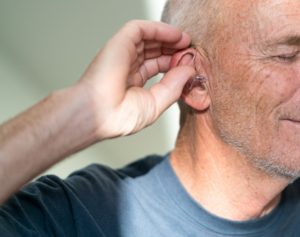
The problem is that only 12% of those who have a formal diagnosis of hearing impairment actually get the devices. This study has helped to reveal gaps in hearing aid use among people of different ethnic and racial backgrounds, geographic locations, and genders.
The Cost of Hearing
Medicare HMOs typically cover some of the cost of the devices for members diagnosed with hearing loss by an audiologist, but even those patients don’t seem to get them. With so many patients suffering from hearing loss and not getting the devices to help them, this study set out to find the implications behind this problem.
The research conducted by a University of Michigan team used data from nearly 115,000 people over the age of 66 with hearing loss and insurance coverage through a Medicare HMO between 2008 and 2016. The findings were published in the Journal of the American Geriatrics Society.
The study showed that men with hearing loss were 13.3% more likely to receive a hearing aid, compared to only 11.3% of women. Only 6.5% of people of Latino heritage received a hearing aid for their hearing loss, compared with 9.8% of African-Americans and 13.6% of whites.
When the findings were analyzed, the outcome of the patients who received hearing aids compared to those who didn’t showed significant differences. The patients who used hearing aids had an 18% lower risk of developing dementia, including Alzheimer’s disease. This was shown over the first three years of patients receiving the hearing aids. The risk of being diagnosed with depression or anxiety was 11% lower for hearing aid users, and the risk of being treated for fall-related injuries was 13% lower.
The study also confirmed previous research that suggested that patients with hearing loss had much higher rates of dementia, depression, and fall injuries than the general population.
Elham Mahmoudi. who led the study, spoke about the findings: “We already know that people with hearing loss have more adverse health events, and more co-existing conditions, but this study allows us to see the effects of an intervention and look for associations between hearing aids and health outcomes,” she says. “Though hearing aids can’t be said to prevent these conditions, a delay in the onset of dementia, depression and anxiety, and the risk of serious falls, could be significant both for the patient and for the costs to the Medicare system.”
“Correcting hearing loss is an intervention that has evidence behind it, and we hope our research will help clinicians and people with hearing loss understand the potential association between getting a hearing aid and other aspects of their health,” added Mahmoudi.
While all physicians need to be made aware of the connection between mental health and hearing loss, all states need to make hearing aids more available to those in need. Mahmoudi noted in the conclusion of the study that Medicaid in the state of Michigan is now covering hearing aid testing, fitting, and purchase since a policy change in 2018. This will allow her team to study the impacts in this population as well.